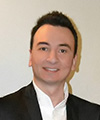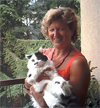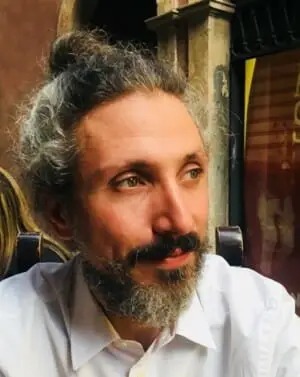Studying at the University of Verona
Here you can find information on the organisational aspects of the Programme, lecture timetables, learning activities and useful contact details for your time at the University, from enrolment to graduation.
Academic calendar
The academic calendar shows the deadlines and scheduled events that are relevant to students, teaching and technical-administrative staff of the University. Public holidays and University closures are also indicated. The academic year normally begins on 1 October each year and ends on 30 September of the following year.
Course calendar
The Academic Calendar sets out the degree programme lecture and exam timetables, as well as the relevant university closure dates..
| Period | From | To |
|---|---|---|
| Sem. IA | Sep 25, 2017 | Nov 11, 2017 |
| Sem. IB | Nov 13, 2017 | Jan 20, 2018 |
| Sem. IIA | Feb 26, 2018 | Apr 21, 2018 |
| Sem. IIB | Apr 23, 2018 | Jun 9, 2018 |
| Session | From | To |
|---|---|---|
| Sessione Invernale | Jan 22, 2018 | Feb 24, 2018 |
| Sessione Estiva | Jun 11, 2018 | Jul 28, 2018 |
| Sessione Autunnale | Aug 27, 2018 | Sep 22, 2018 |
| Sessione Straordinaria | Jan 14, 2019 | Feb 16, 2019 |
| Session | From | To |
|---|---|---|
| Sessione Estiva | Jul 16, 2018 | Jul 21, 2018 |
| Sessione Autunnale | Nov 12, 2018 | Nov 17, 2018 |
| Sessione Primaverile | Apr 1, 2019 | Apr 6, 2019 |
| Period | From | To |
|---|---|---|
| All Saints Day | Nov 1, 2017 | Nov 1, 2017 |
| Immaculate Conception | Dec 8, 2017 | Dec 8, 2017 |
| Christmas break | Dec 22, 2017 | Jan 7, 2018 |
| Easter break | Mar 30, 2018 | Apr 3, 2018 |
| Liberation Day | Apr 25, 2018 | Apr 25, 2018 |
| Labour Day | May 1, 2018 | May 1, 2018 |
| Patron Saint Day | May 21, 2018 | May 21, 2018 |
| Republic Day | Jun 2, 2018 | Jun 2, 2018 |
| Summer break | Aug 13, 2018 | Aug 18, 2018 |
Exam calendar
Exam dates and rounds are managed by the relevant Humanistic Studies Teaching and Student Services Unit.
To view all the exam sessions available, please use the Exam dashboard on ESSE3.
If you forgot your login details or have problems logging in, please contact the relevant IT HelpDesk, or check the login details recovery web page.
Should you have any doubts or questions, please check the Enrollment FAQs
Academic staff
 alex.arcozzi@univr.it
alex.arcozzi@univr.it
 augusto.barbi@univr.it
augusto.barbi@univr.it
 evita.calabrese@univr.it
evita.calabrese@univr.it
Carnero Roberto
 roberto.carnero@univr.it
roberto.carnero@univr.it

Mastrocinque Attilio
 attilio.mastrocinque@univr.it
attilio.mastrocinque@univr.it
 +39 045802 8386
+39 045802 8386
 linda.napolitano@univr.it
linda.napolitano@univr.it
 stefania.torquati@univr.it
stefania.torquati@univr.it
 nicola.turrini@univr.it
nicola.turrini@univr.it
 gianmaria.varanini@univr.it
gianmaria.varanini@univr.it
Study Plan
The Study Plan includes all modules, teaching and learning activities that each student will need to undertake during their time at the University.
Please select your Study Plan based on your enrollment year.
1° Year
| Modules | Credits | TAF | SSD |
|---|
One course to be chosen among the following2° Year activated in the A.Y. 2018/2019
| Modules | Credits | TAF | SSD |
|---|
One course to be chosen among the followingOne/two course to be chosen among the followingOne course to be chosen among the followingOne course to be chosen among the following3° Year activated in the A.Y. 2019/2020
| Modules | Credits | TAF | SSD |
|---|
Two/four courses to be chosen among the followingOne/two courses to be chosen among the following| Modules | Credits | TAF | SSD |
|---|
One course to be chosen among the following| Modules | Credits | TAF | SSD |
|---|
One course to be chosen among the followingOne/two course to be chosen among the followingOne course to be chosen among the followingOne course to be chosen among the following| Modules | Credits | TAF | SSD |
|---|
Two/four courses to be chosen among the followingOne/two courses to be chosen among the following| Modules | Credits | TAF | SSD |
|---|
Legend | Type of training activity (TTA)
TAF (Type of Educational Activity) All courses and activities are classified into different types of educational activities, indicated by a letter.
Type D and Type F activities
Modules not yet included
Philosophical Hermeneutics (i) (2018/2019)
Teaching code
4S02100
Teacher
Coordinator
Credits
6
Language
Italian
Scientific Disciplinary Sector (SSD)
M-FIL/01 - THEORETICAL PHILOSOPHY
Period
Sem. 1A dal Sep 24, 2018 al Nov 10, 2018.
Learning outcomes
The principal aim of the course is to give an adequate understanding of what properly philosophical hermeneutics is. Hermeneutics is usually understood as the discipline and art of interpretation. This type of hermeneutics arises from the exegesis of sacred and humanistic texts, which follows the rediscovery of Greek civilization with the Italian Renaissance and the free reading of the Bible with the German Reformation. The theory of interpretation is a philological and religious hermeneutics, it is a tool for understanding the written text and the fideistic subjectivity. Instead, properly philosophical hermeneutics is not a theory of interpretation and has nothing to do with text and language. Philosophical hermeneutics was born in the twentieth century with Husserl - which defines phenomenology as a "hermeneutics of conscious life" - and with Heidegger, for whom the exercise of philosophy is a "hermeneutics of facticity", ie the understanding that existence has of itself. This hermeneutics is not "interpretation" but "explication" and "unfolding" (Auslegung), ie spontaneous articulation of being, an event that precedes language and in which Being unfolds and participates in all possible ways of being.
At the end of the course the students will be able to follow the twisting paths of 20th century hermeneutics with greater awareness and agility and will have a genealogical knowledge of certain discursive and social practices of which their daily existence is made.
Program
THE VORTEX
Among the structures that give shape and coherence to things and to the experience of things, some have been theorized by philosophy with a certain obsessiveness, allowing it to be used even at a conspicuous historical distance. The vortex is a strategic figure of thought, but difficult to place: it is an example of spontaneous germination and functions as the solution to a problem. The vortex is - says Pound - "node or cluster", rhythm of connection and dissolution of the forces that intersects the mineral, vegetable, animal world and time of the spirit.
On October 25th and 26th there will be a workshop with guests from the Universities of L'Aquila, Bologna and Turin: "Figures of the transcendental: between Kant and Deleuze", the PDF of the poster can be downloaded from the teaching materials
All documents will be uploaded in PDF format on this page, except Blanqui's book. The course will begin with an analysis of some steps of this text, students are asked to have it with them from the first lesson.
| Author | Title | Publishing house | Year | ISBN | Notes |
|---|---|---|---|---|---|
| Edgar A. Poe | La discesa nel Maelström | ||||
| Auguste Blanqui | L'eternità attraverso gli astri | SE | 2005 | ||
| Gilbert Simondon | L'individuazione alla luce delle nozioni di forma e di informazione | Mimesis | 2011 | "Introduzione" e "Forma e materia" | |
| Filippo T. Marinetti | Manifesto del Futurismo | ||||
| Umberto Boccioni, Carlo Carrà | Pittura Scultura Futuriste | Edizioni Futuriste di "Poesia" | 1914 | "Dinamismo Plastico" e "La pittura dei suoni, rumori, odori" | |
| Ezra Pound | Vorticism |
Examination Methods
Exam is oral and evaluates the mastery of the topics and concepts contained in the books indicated in the bibliography. The questions evaluate the vocabulary, the critical-argumentative capacity, the ability to autonomously rework what has been learned.
Teaching materials e documents
-
 Boccioni, Dinamismo plastico
(pdf, it, 438 KB, 12/10/18)
Boccioni, Dinamismo plastico
(pdf, it, 438 KB, 12/10/18)
-
 Marinetti, Manifesto del Futurismo
(pdf, it, 1380 KB, 15/10/18)
Marinetti, Manifesto del Futurismo
(pdf, it, 1380 KB, 15/10/18)
-
 Poe, Una discesa nel Maelstrom
(pdf, it, 973 KB, 07/10/18)
Poe, Una discesa nel Maelstrom
(pdf, it, 973 KB, 07/10/18)
-
 Pound, Vorticism
(pdf, it, 264 KB, 02/09/18)
Pound, Vorticism
(pdf, it, 264 KB, 02/09/18)
-
 Simondon, L'individuazione
(pdf, it, 5780 KB, 14/11/18)
Simondon, L'individuazione
(pdf, it, 5780 KB, 14/11/18)
-
 Workshop: "Figure del trascendentale"
(pdf, it, 169 KB, 10/09/18)
Workshop: "Figure del trascendentale"
(pdf, it, 169 KB, 10/09/18)
Career prospects
Module/Programme news
News for students
There you will find information, resources and services useful during your time at the University (Student’s exam record, your study plan on ESSE3, Distance Learning courses, university email account, office forms, administrative procedures, etc.). You can log into MyUnivr with your GIA login details: only in this way will you be able to receive notification of all the notices from your teachers and your secretariat via email and soon also via the Univr app.
Student mentoring
Linguistic training CLA
Gestione carriere
Practical information for students
Documents
| Title | Info File |
|---|---|
|
|
pdf, it, 325 KB, 02/05/23 |
|
|
pdf, it, 212 KB, 02/05/23 |
|
|
pdf, it, 131 KB, 02/05/23 |
Graduation
Documents
| Title | Info File |
|---|---|
|
|
pdf, it, 99 KB, 13/10/23 |
|
|
pdf, it, 101 KB, 10/04/24 |
































